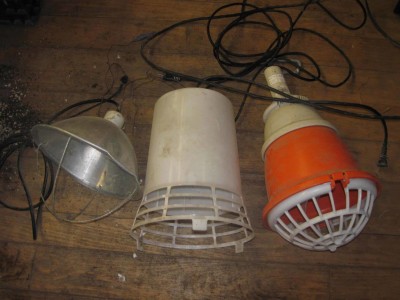Safety for Supplementing Heat to Livestock
Amy Barkley, Livestock Specialist
Southwest New York Dairy, Livestock and Field Crops Program

Safety for Supplementing Heat to Livestock
When it becomes necessary to provide supplemental heat to livestock, management of the barn and heat sources is important to ensure building and livestock safety.
While most livestock can tolerate colder temperatures well, there are times when providing supplemental heat may be necessary to promote their health and welfare. Newborn animals entering the world in the middle of the coldest months is just one example. While there are many ways to supplement heat, mindful steps need to be taken to ensure that those heat sources are both effective and safe.
Heat lamps are one of the most commonly used heat sources due to their low cost and simplicity. However, they are a major cause of barn fires, making design selection crucial for safety. Lamps should have solid ceramic bases, thick, intact cords, and a protective covering around the bulb. The protective covering, which is made of a wire or plastic, keeps the bulb from touching the ground should the heat lamp fall, and reduces the risk of animals potentially breaking the bulb.
Other options for heating include radiant plates, heat pads, and gas heaters, though these should be rated for barn use, firmly affixed to the wall, ceiling, or floor, and kept out of reach of livestock. Portable space heaters are not a good idea, since they can be knocked over by animals. Ideally, heaters should have an automatic shut-off in the case they are tipped.
A few general rules can help promote safe heating. Dust accumulations on any heater should be regularly removed. If possible, heaters should be kept at least two feet away from flammable items such as wood, bedding, fertilizer, pesticides, or cobwebs. Any device should be plugged directly into the wall; using extension cords can increase the risk of fire and malfunctions.
Commercial-sized (5 - 10 pound) fire extinguishers should be kept within easy reach in and around farm buildings. An ABC extinguisher is best, since it can tackle the various fire classes that can start within a barn. The installation of fire alarms, especially in areas where supplemental heat is used, can provide an advance notice of a fire. This can result in quicker response times, saving a barn or livestock. Having an emergency plan in place in the case of a fire including a list of contacts and evacuation plan is advantageous should an adverse event happen.
Supplemental heat is a tool that can be used to maintain the health and comfort of some newborn animals such as chicks, piglets, kids, and lambs; smaller livestock like rabbits, which may be more sensitive to cold; and individuals in poor health which cannot make enough of their own body heat. While heating a livestock area can present risks, they can be mitigated by following the considerations above.
If you are interested in learning more about heating barns or heater safety, contact Livestock and Beginning Farm Specialist, Amy Barkley, at 716-640-0844 or amb544@cornell.edu.
Photo Caption: Heat lamps have varying levels of safety. In this image, the most expensive, safest style is on the right, and the cheapest, riskiest style is on the left. Photo by Michael Glos of Kingbird Farm. This photo was originally shared by the Cornell Small Farms Program.
Upcoming Events
WEBINAR - Automated Milking Systems Efficiency: Balancing Focus on Individual Cows and System Optimization
May 8, 2024
Please join Cornell the SWNY team and MSU Extension for our talk with Dr. Pablo Silva Boloña on improving efficiency of Automated milking systems by focusing on milking settings for individual and group success.
Broiler Field Day at Sunny Cove Farm
June 6, 2024
Alfred Station, NY
Join us for a field day to explore broiler production, processing, and finances. Meghan Snyder of Sunny Cove Farm will be our host. She raises small batches of organic broilers, processing them on-farm under the 1,000 bird exemption.
Stockmanship and Stewardship 2024
October 25, 2024
Hamburg, NY
Save the date!! The event is one of 4 across the US and is a two-day educational experience featuring low-stress cattle handling demonstrations, Beef Quality Assurance educational sessions, facility design sessions, and industry updates.
Announcements
No announcements at this time.





